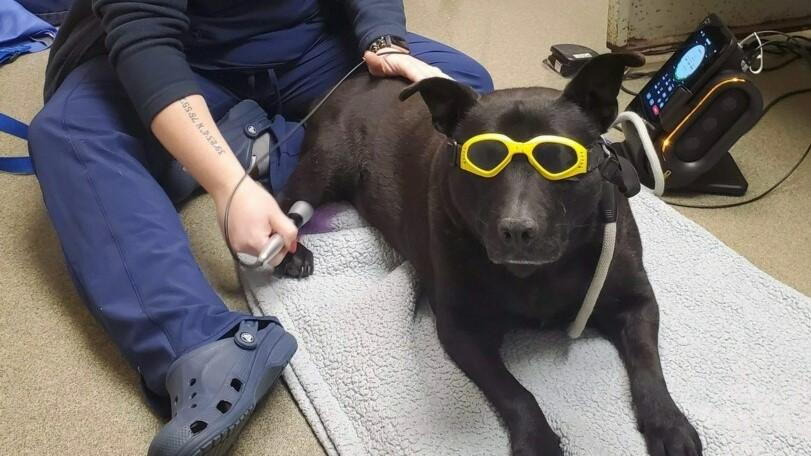Is Laser Therapy Right for Your Pet?

- posted: Feb. 20, 2021
Is Laser Therapy Right for Your Pet?
There are many ways to manage pain and inflammation in our pets including drugs, supplements, and non-traditional or alternative therapies such as acupuncture and laser therapy. Patton Veterinary Hospital offers therapeutic laser sessions for a variety of problems. But what is laser therapy and what conditions does it treat? Let’s learn more.
A therapeutic laser uses light to excite cells which increases production of cellular energy molecules called ATP (adenosine triphosphate). ATP helps to increase cellular metabolism which enhances tissue repair and cell growth thus helping wounds to heal faster. ATP also acts as a neurotransmitter and aids in reducing pain. Lasers also stimulate stem cells and reduce inflammation which reduces pain and encourages healing.
Laser therapy is recommended for a variety of medical conditions. Lasers can reduce muscle and joint pain so laser therapy is often used to reduce pain associated with chronic conditions such as arthritis or disk disease but it can also be used for acute conditions like sprains or other injuries. Lasers are also employed post-operatively for patients who have had cruciate ligament repair, limb amputation or other orthopedic surgeries.
Lasers can be used in conjunction with other treatments but could also serve as an alternative therapy in patients who may not be able to use traditional pain medications such as NSAIDs (non-steroidal anti-inflammatories or aspirin-type drugs) due to underlying medical conditions like kidney disease or individual sensitivity to certain drugs. Laser therapy may be especially beneficial for cats or exotic pets since medication choices are often limited and they may be difficult to medicate.
Lasers are also great for treating difficult-to-heal wounds, severe ear infections, lick granulomas (callouses that form from chronic licking), or for treating post-operative incisions. At Patton Veterinary Hospital, we usually treat all post-op incisions (except for tumor removal) with our therapeutic laser and we use it on patient’s gums after dental procedures to reduce inflammation.
There are few contraindications to using laser therapy, but lasers should not be used on masses or on patients with cancer.
Laser therapy tends to be cumulative-the more sessions a pet receives for a chronic condition, the better the effect. Depending on the condition, pets may receive a single session or up to 6 sessions then may continue with periodic maintenance sessions to continue benefits for chronic pain conditions like arthritis.
As you can see, there are many benefits to laser therapy in our companion animals. Ask our staff if laser therapy might be right for your pet for conditions such as chronic pain, non-healing wounds or post-surgery.
This blog brought to you by the Patton Veterinary Hospital serving Red Lion, York and the surrounding communities.
https://www.aaha.org/your-pet/pet-owner-education/ask-aaha/laser-therapy/
https://todaysveterinarypractice.com/recovery-rehab-laser-therapy-in-companion-animals-2/
Location
Patton Veterinary Hospital
425 E Broadway
Red Lion, PA 17356
